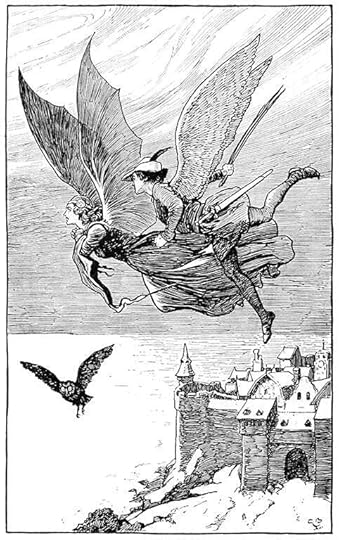What do you think?
Rate this book


385 pages, Chapbooks in slipcase
Published October 1, 2021
Big spotted spiders with silver crowns on their heads were kept spinning long hanging bridges from one bush to another, and palaces, which looked like glittering glass in the moonlight when the fine dew settled on them.. It’s made me want to pick up HCA again. 1st line: "Poor John was in sad trouble, for his father was very ill and could not recover." (1835) 5/5
Wang-Fo painted her one last time. Because he loved the green hue that suffuses typeface of the dead. His disciple Ling mixed the colors and the task needed such concentration that he forgot to shed tears.Lovely.
 A plate from Hans Christian Anderson's The Travelling Companion, which was featured on Day 18.
A plate from Hans Christian Anderson's The Travelling Companion, which was featured on Day 18.I’ve read the Short Story Advent Calendar since 2017, so I was thrilled when it came back for 2021. This time with an exciting twist - a new editor to bring stories from different countries every day. However, my expectations were too high because this was a disappointment.
Some choices were simply uninspired, like Tolstoy for Russia, Homer for Greece, and H.C. Andersen for Denmark. Why not take the opportunity to highlight lesser-known authors? The stories were old, 20/25 were over 20 years old, and many were moralizing and preachy.
It was also odd to have Myanmar be represented by the British author Saki (born there to British parents and moved back to Britain when he was 2), telling a story about British society. Likewise, an odd choice to have two retellings of Chinese stories by Japanese and Belgian authors.Out of the 25 stories, only 5 had female writers. There’s just no excuse for that.
On the positive side, some stories were beautiful, and I found some new authors to explore, like Dubravka Ugrešić from Croatia.
“Fearing that I might not be a jewel, I made not effort to polish myself; but half-believing that I might be a jewel, I could not rest content among the common clay.”
- Atsushi Nakajima, "The Moon Over the Mountain" (Japan)
“For the thousandth time since her accident I was flooded with sudden, acute disappointment at how I had so quickly reached the limits of my love.”
- Chris Womersley, "A Lovely and Terrible Thing" (Australia)